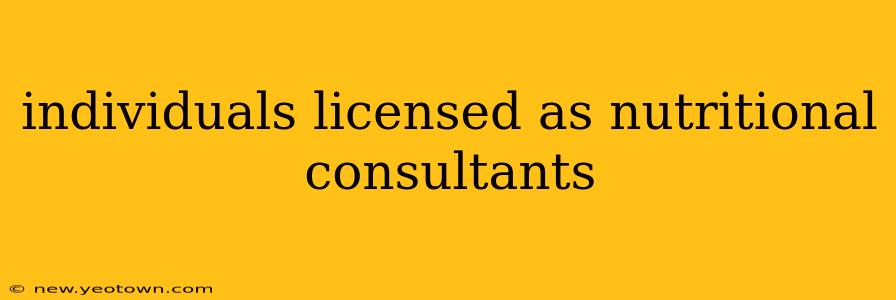The world of nutrition is brimming with information, often leaving individuals overwhelmed and searching for reliable guidance. This is where licensed nutritional consultants step in, offering expertise and personalized support to help people achieve their health goals. But what exactly does it mean to be a licensed nutritional consultant? This article delves into the complexities of this profession, exploring the qualifications, responsibilities, and benefits of seeking their guidance. Let's embark on this journey together.
What is a Licensed Nutritional Consultant?
Imagine a trusted advisor, deeply versed in the science of nutrition, guiding you toward a healthier lifestyle. That's the essence of a licensed nutritional consultant. Unlike the unregulated world of nutrition advice often found online, licensed professionals hold specific credentials, demonstrating a commitment to education, ethical practice, and ongoing professional development. The exact title and licensing requirements vary significantly depending on location (country and state/province), making it crucial to understand the regulations in your specific area.
What are the Qualifications of a Licensed Nutritional Consultant?
This is where things get nuanced. There isn't a universally recognized "Nutritional Consultant" license. The path to becoming a qualified professional often involves a blend of education, examinations, and practical experience. Some professionals hold advanced degrees such as a Master's in Nutrition, while others might have registered dietitian (RD) or registered dietitian nutritionist (RDN) credentials, depending on the regulatory body in their region. In some areas, certifications from reputable organizations can provide a benchmark of competency. These may require rigorous training, examinations, and continuing education to maintain the certification. Always inquire about a consultant's qualifications and verify their credentials through the relevant licensing board or certifying organization.
What are the Responsibilities of a Licensed Nutritional Consultant?
Licensed professionals take their responsibility seriously. Their primary aim is to provide safe and effective nutritional guidance, tailored to individual needs and circumstances. This could involve:
- Assessing dietary intake: Analyzing current eating habits to identify potential deficiencies or excesses.
- Developing personalized meal plans: Creating customized plans that consider individual health goals, preferences, and any dietary restrictions.
- Providing education and counseling: Educating clients on nutrition principles and helping them adopt sustainable lifestyle changes.
- Monitoring progress: Tracking client progress and adjusting plans as needed.
- Referring to other healthcare professionals: Collaborating with other healthcare providers when necessary to provide holistic care.
What are the Benefits of Consulting a Licensed Nutritional Consultant?
The advantages of working with a licensed professional are numerous:
- Personalized guidance: Receive tailored advice based on your unique needs and health status.
- Evidence-based practices: Benefit from approaches rooted in scientific research and proven effective.
- Increased accountability: Having a professional to guide you enhances commitment to your health goals.
- Improved health outcomes: Achieve better health outcomes through targeted nutritional interventions.
- Reduced risk of misinformation: Avoid potentially harmful advice from unreliable sources.
How Do I Find a Licensed Nutritional Consultant?
Finding the right consultant requires careful consideration. Start by researching regulatory bodies in your area to understand licensing requirements. Online directories and professional organizations can be helpful resources. Read reviews and testimonials before making a decision. Don't hesitate to schedule an introductory consultation to discuss your needs and assess whether the consultant's expertise aligns with your goals.
What is the Difference Between a Registered Dietitian (RD) and a Nutritional Consultant?
This is a critical distinction. The term "Registered Dietitian" (RD) or "Registered Dietitian Nutritionist" (RDN) usually indicates a higher level of education, licensure, and regulated practice. RDs/RDNs have undergone rigorous academic training and passed national examinations. Nutritional consultants, while potentially qualified, may not have the same level of formal education or regulation, varying significantly depending on location.
Are there different types of Licensed Nutritional Consultants?
The field of nutrition is diverse. Some consultants specialize in specific areas, such as sports nutrition, pediatric nutrition, or weight management. Identifying a consultant with expertise relevant to your individual needs is important.
What should I ask a potential Nutritional Consultant?
Asking the right questions is essential. Inquire about their qualifications, experience, approach, fees, and any potential conflicts of interest. Clarify their licensing or certification and ensure you feel comfortable and confident in their expertise.
Navigating the world of nutrition can be challenging. By seeking the guidance of a licensed nutritional consultant, you invest in your health and well-being, gaining access to evidence-based expertise and personalized support. Remember, always verify credentials and prioritize your safety and health.

